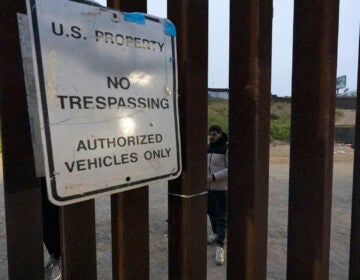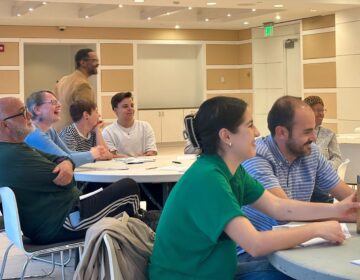U.S. high court denies petition by women held in Berks immigrant detention center [updated]
The U.S. Supreme Court has refused to review a petition by two dozen Central American women and their young children to have their asylum cases considered outside of federal immigration courts.
The decision is an enormous setback for the plaintiffs, who sought to have their cases heard in front of a member of the judicial branch, rather than immigration judges, who work for the Department of Justice, a process immigrant rights advocates say is slanted to favor the government.
It has also drawn criticism from some constitutional scholars who say the case should have been heard to clarify the rights of immigrants facing deportation.
Fourteen of the women named in the case, along with their children, have been detained by U.S. Immigration and Customs Enforcement in the Berks Family Residential Center in Leesport, Pennsylvania, for the year and a half it took their case to wend through a series of appeals.
On Monday morning, they gathered in small groups in the center’s legal consultation room, to discuss with their lawyers what options remain.
“Unless we can do the nearly impossible, which we’ve done before anyway, then they’ll be sent back, and it will all be for nothing,” said attorney Carol Anne Donohoe afterwards. “That’s just unbearable.”
The women fled Honduras, Guatemala or El Salvador in 2015, claiming that rampant gang activity and violence against women made it unsafe for them to remain. The families’ prolonged detention in Berks has sparked protests by local and international advocacy groups, and a hunger strike by the women last summer.
The process
Typically, when illegal border-crossers come into contact with U.S. Customers and Border Patrol agents, they can request asylum, as the plaintiffs in this case did.
From there, federal immigrations agents interviewed the women to determine if they had “credible fear” of returning to their countries of origin. If it is determined that they do, their claim can move forward.
But if they fail that test, immigrants are placed in removal proceedings. That fate befell the plaintiffs, although their lawyers claim the test was shoddily administered and their clients have valid grounds for asylum.
The 14 women housed in Berks County, as well as the others in the case, appealed the ruling to an immigration judge, who would not grant them relief.
Attorneys with the American Civil Liberties Union, who represent the plaintiffs in this case, argued that those deportations are unconstitutional, under the writ of habeas corpus. That law asserts anyone in the United States, regardless of immigration status, who the government wants to imprison or deport has the right to have their case heard before a judge.
The American Bar Association filed supporting documents on behalf of the petitioners, arguing that the 3rd U.S. Circuit Court of Appeals ruling denying habeas rights represents a dangerous precedent.
“Judicial review of executive and legislative action is essential to a functioning democracy,” wrote ABA president Linda Klein. “The ABA is deeply concerned that, for the first time in our country’s history, a federal court of appeals has held that noncitizens who are within the United States can be denied” the opportunity for a judge to review their claims.
In that decision, Judge D. Brooks Smith wrote on behalf of the Circuit Court panel, “We are sympathetic to the plight of Petitioners and other aliens who have come to this country seeking protection and repose from dangers that they sincerely believe their own governments are unable or unwilling to address. Nevertheless, Congress has unambiguously limited the scope of judicial review, and in so doing has foreclosed review of Petitioners’ claims.”
The Supreme Court’s refusal to hear an appeal on that Circuit Court decision allows a “dangerous precedent” to stand, said Seton Hall law professor and constitutional law expert Jonathan Hafetz. “It opens the door to abuse by immigration authorities, and I think it undermines basic protections of all persons in the United States.”
The U.S. Supreme Court denies all but about 1 percent of petitions it receives.
While waiting for their federal case to proceed, some of the plaintiffs succeeded in having their own or their childrens’ immigration status changed. Attorneys are requesting that the rest have their cases reheard by an immigration judge, but immigration courts are not required to extend that opportunity.
WHYY is your source for fact-based, in-depth journalism and information. As a nonprofit organization, we rely on financial support from readers like you. Please give today.




